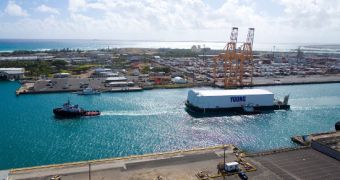Yesterday, researchers working with the Sandia National Laboratories in the United States announced that, should things go as planned, it will not be long until the Port of Honolulu has at least part of its energy demand met by what they call a portable hydrogen fuel cell unit.
In a press release on the matter at hand, the scientists detail that, until recent years, activities carried out in ports in the United States remained rather poorly regulated, at least in terms of trying to limit their impact on the environment.
This happened despite the fact that, as shown by several studies, ports in the United States are major pollutants emitters and can therefore have a negative impact on both water and air quality, they go on to detail.
The good news is that efforts are now being made to green up the country's docking areas. According to the researchers at Sandia National Laboratories, hydrogen fuel cells can help ports achieve their sustainability goals.
The first step in having fuel cell technology aid docking areas improve on their ecological footprint is expected to be taken in 2015, when the Port of Honolulu should get a portable, self-contained hydrogen fuel unit.
According to Project Manager Joe Pratt, this unit will fit inside a 20-foot (roughly 6.1 meters) shipping container, and its operators will be able to have it float on a barge or sit on a dock, or transport it to whatever location it might be needed.
He further details that the unit will comprise 30-kilowatt fuel cells, a hydrogen storage system and power conversion equipment. “No one has ever built this kind of custom unit for this purpose,” Joe Pratt stresses.
The Sandia National Laboratories researchers working on this project expect that, once the Port of Honolulu gets its portable hydrogen fuel cell unit, both its emissions and its energy consumption will be reduced to a considerable extent.
Information shared with the public says that the unit is to be delivered to and deployed by Young Brothers Ltd., a subsidiary of Foss Maritime Company.
Currently, Young Brothers Ltd. is the main shipper of goods throughout the Hawaiian Islands, and relies on diesel engine generators to power refrigerated containers.
Work on designing and engineering the portable hydrogen fuel cell unit is expected to be completed sometime towards the middle of 2014. After this, fabrication and assembly activities will commence.
Once the unit is completed, Young Brothers Ltd. employees are to undergo training in order to know how best to use it.

 14 DAY TRIAL //
14 DAY TRIAL //